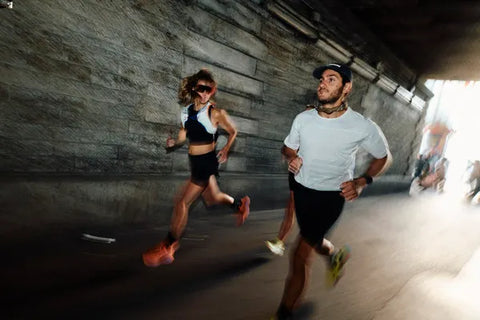There are 10km runs and there are 10km races. While the distance seems pretty reasonable even for a beginning runner, there is a big difference between a 10km Sunday morning fun run and running a 10km race where a good result is a goal. A 10km is often a runner’s first race that requires specific training to optimize performance and dial in the perfect pace. Here are our training tips for running a 10km race.
When you run with a goal in mind the biggest difficulty, regardless of the distance, is knowing the best way to manage your effort. That’s why a training program that’s progressive and varied is essential for determining the full extent of your abilities and which you’ll ultimately need to achieve your goal. Your ideal training program will alternate between interval exercises and endurance sessions as your training progresses from week to week. Interval exercises involve alternating between rapid running and recovery phases. They are essential for getting faster because they improve cardiovascular fitness, strengthen and energize muscles and also improve recovery. Running intervals will improve your endurance and increase your pace as well as develop your MAS.
MAS
What is MAS? Maximal aerobic speed, or MAS, is the running speed at which a person consumes maximum oxygen (VO2 max). Below this speed, oxygen consumption changes in proportion to the effort. Above this speed, oxygen consumption remains constant.
MAS is one of the fundamentals needed when you put together a training program. It’s a reference that allows you to measure your progress and fix your pace, especially for intervals. Knowing your MAS, and creating your training program based on it, allows you to maximize the amount of energy provided by the oxygen you consume, which is called aerobic metabolism. This metabolism releases energy relatively slowly and regularly and that’s what enables sustained effort.
Warning: don’t confuse MAS with maximum speed or sprint speed. It’s possible to run faster than your MAS.
How to calculate MAS
There are several ways to calculate MAS. You can go to a performance lab or a gym to get a precise calculation of this value, however, it is easy enough to estimate your MAS on your own. To do so, it’s necessary to carry out a stress test in the field. Several tests are used to calculate MAS and the one that’s most common and easiest to do is the half-Cooper test, which is done on flat, smooth ground.
The Half Cooper Test
Start by warming up and then measure (in meters) the maximum distance you can run in six minutes. To find your MAS, divide the distance by 100.
MAS = Distance (meters) traveled / 100
For example, if you run 1000 meters, your MAS is 10 km/h.


8-WEEK TRAINING PLAN
For an 8-week training plan, it’s most often recommended to schedule four sessions a week then cutting back to just two sessions during the week before the race.
- Each week alternate an interval session with an endurance session. This will allow you to find your rhythm and spread out the different sessions.
- Always start your interval training with a 20- to 25-minute warmup. You do this to get your body gradually up to speed which will help you avoid injury.
- Finish your sessions with 10 minutes of jogging to cool down.
- The most effective ways to do interval training are to run on a track (400m, 600m, or 800m) or to run with a GPS watch.
During your jog, don’t hesitate to add a few climbs and descents in your route. This will help you manage your efforts and your breathing. You can also vary the terrain to work on concentration and changes in pace. Be sure to check out our article on how to choose your running shoes.
During the week before the race, ease up on your training program to save energy for race day. Two training sessions will be sufficient for the week before the race: a short interval session and a recovery jog.
You can also check out our articles on how to train for a half-marathon or a marathon.
Now that you’re ready, have a great race!

